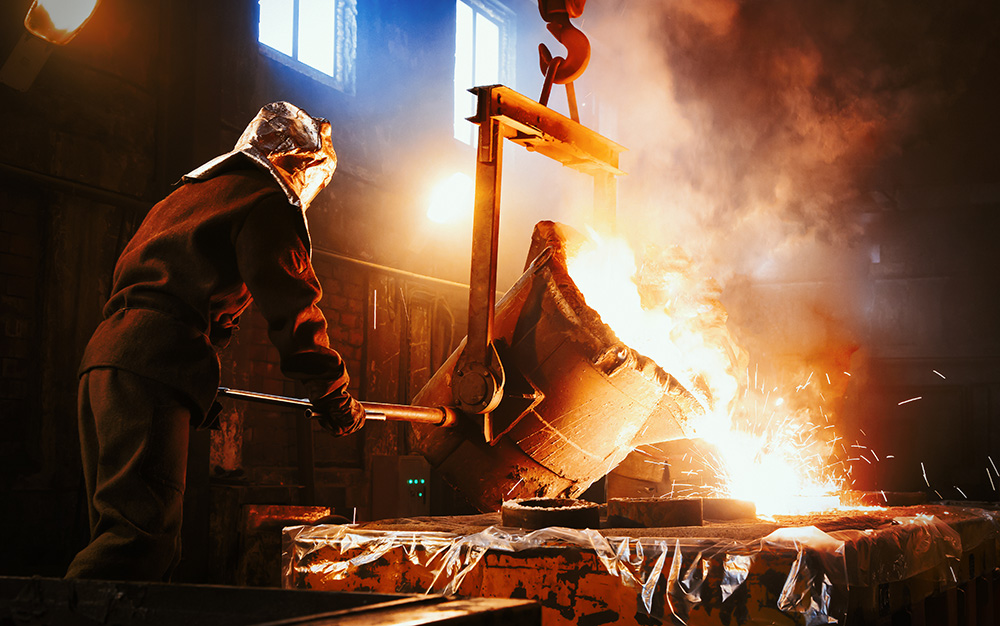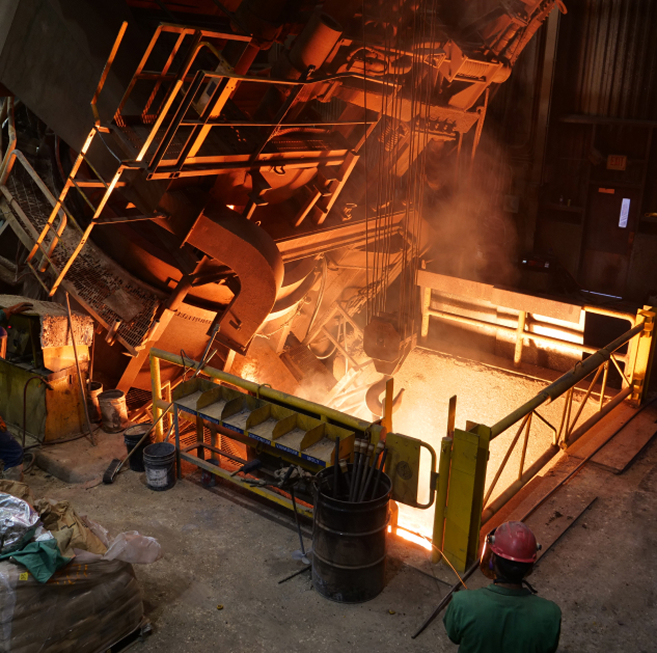A beginner’s guide to the Metal Casting process and its industrial applications
Discovering the Duty of a Metal Foundry in Modern Manufacturing Processes
Metal foundries are critical in the landscape of modern production. They supply important parts across various sectors, adjusting to the needs of markets like automotive and aerospace. Advanced techniques such as 3D printing and automated casting have actually changed their operations. Furthermore, sustainability has come to be a concern, affecting their methods. As these foundries progress, the ramifications for manufacturing effectiveness and development are significant, questioning regarding their future trajectory in an ever-changing economic situation.
The Development of Metal Casting Techniques

With the rise of mass production, foundries embraced techniques like die casting and shed foam casting, simplifying the production procedure and minimizing waste. Each advancement in metal casting strategies has actually accommodated the demands of numerous industries, from automobile to aerospace. As metal casting remains to advancement, the interplay between technique and modern technology remains crucial in meeting modern production obstacles, guaranteeing that foundries adapt and flourish in an ever-changing landscape.
Assimilation of Advanced Technologies in Foundries
Although traditional metal casting methods have actually offered the market well for centuries, the integration of innovative modern technologies in foundries is reinventing the manufacturing landscape. Automation and robotics improve production processes, boosting performance and minimizing the danger of human mistake. As soon as impossible with standard techniques, technologies such as 3D printing permit for quick prototyping and the development of intricate geometries that were. Furthermore, information analytics and the Net of Things (IoT) make it possible for real-time tracking and anticipating maintenance, inevitably leading to reduced downtime and raised performance. These innovations additionally promote customization, allowing makers to react rapidly to market needs. As sustainability becomes a concern, the adoption of eco friendly innovations, such as electrical melting heaters and progressed sand improvement systems, better shows the sector's commitment to technology. Jointly, these technologies not only boost operational effectiveness however additionally position foundries at the forefront of contemporary production techniques.
The Influence of Material Scientific Research on Foundry Workflow
Product science plays an essential role in improving shop procedures, influencing both the choice of products and the overall casting process. Advances in material science give a deeper understanding of the properties of alloys and steels, making it possible for foundries to select the most appropriate products for particular applications. This understanding improves the efficiency and toughness of actors products, which is crucial for fulfilling industry criteria.
Advancements in material formulations and ingredients add to enhanced casting techniques, decreasing problems and optimizing production performance. The advancement of advanced metal compounds and wise materials permits foundries to create lighter, more powerful parts, which are significantly searched for in numerous markets such as vehicle and aerospace.
Furthermore, product science help in the recycling of metals, making processes a lot more economical and efficient. By leveraging the most recent findings in product science, foundries can adjust to developing market needs, ensuring their competition in a rapidly transforming manufacturing landscape.
Sustainability Practices in Modern Metal Foundries
With the expanding emphasis on environmental obligation, modern-day metal foundries are progressively applying sustainability methods to decrease their environmental impact (Aluminum Casting). One vital technique involves the recycling of scrap metal, which not just reduces waste however additionally conserves energy and raw products. Foundries are taking on advanced melting innovations that boost power efficiency, as a result reducing greenhouse gas exhausts. Additionally, making use of ecologically pleasant coatings and materials has gotten grip, further decreasing unsafe emissions during production
Water conservation methods, such as closed-loop air conditioning systems, are being applied to decrease freshwater use. Many foundries are also purchasing sustainable power resources, like solar and wind, to power their operations, consequently lowering dependence on fossil fuels. Team training programs concentrated on sustainability practices advertise a society of environmental recognition within the workforce. These efforts collectively contribute to a more lasting future for metal foundries while fulfilling the needs of eco-conscious consumers.
The Future of Foundries in an Altering Financial Landscape
As the global economy evolves, foundries face a Find Out More myriad of obstacles and possibilities that will shape their future (Aluminum Foundry). The raising need for lightweight products and advanced alloys requires advancement in production techniques and technological combination. Automation and smart production techniques are ending up being important for enhancing efficiency and lowering functional costs. On top of that, the surge of sustainability issues compels foundries to take on greener procedures and reusing campaigns, lining up with global ecological goals
The financial landscape is likewise shifting, with supply chain disturbances and changing resources rates presenting substantial obstacles. Foundries need to adapt by expanding their supply sources and buying products science. Cooperation with industries such as renewable power and electric automobiles can cultivate growth. Eventually, the future of foundries will certainly depend on their capacity to leverage technological innovations while remaining responsive to market characteristics and environmental imperatives, ensuring their significance in modern-day production.
Frequently Asked Concerns
What Kinds of Metals Are Commonly Utilized in Foundries Today?
Generally used metals in foundries today include aluminum, iron, steel, copper, and zinc. These materials are favored for their diverse buildings, enabling a variety of applications in markets such as auto, aerospace, and construction.
How Does a Foundry Guarantee High Quality Control in Its Products?

What Security Procedures Are Executed in a Metal Foundry?
Metal foundries execute security measures consisting of individual safety devices, ventilation systems to reduce breathing of fumes, regular safety training for employees, emergency action protocols, and extensive tools maintenance to lessen hazards and ensure a risk-free functioning environment.
The length of time Does the Metal Casting Refine Generally Take?
The metal casting process usually takes numerous hours to days, depending on factors such as the complexity of the mold, the sort of metal used, and cooling times. Each project's requirements greatly affect the period.
What Industries Primarily Rely on Metal Foundries for Manufacturing?
Automotive, building and construction, machinery, and aerospace industries mainly count on metal foundries for manufacturing. These fields make use of cast steels for components, making sure resilience and efficiency essential for their particular applications in production and assembly processes.
Metal foundries are pivotal in the landscape of modern production. Metal Foundry. Typical metal casting methods have served the sector well for centuries, the combination of sophisticated technologies in foundries is revolutionizing the production landscape. Breakthroughs in material science give a much deeper understanding of the buildings of alloys and metals, enabling foundries to pick the most appropriate materials for details applications. With the growing emphasis on ecological responsibility, modern-day Source metal foundries are resource progressively executing sustainability techniques to lessen their ecological impact. Automotive, aerospace, building, and machinery sectors mainly count on metal foundries for production